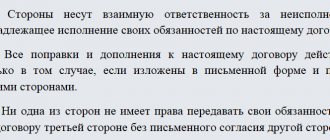The equity participation agreement (hereinafter referred to as the ESA), according to Russian legislation, gives the shareholder the opportunity to terminate it unilaterally. One desire to withdraw from the agreement and demand the money back from the developer is enough.
There can be many reasons for a shareholder: an opportunity to buy housing on the secondary market, moving to another region, unforeseen circumstances (medical expenses, family breakdown, etc.).
But more often than not, the pre-tenancy agreement is terminated for objective reasons: the quality of housing is not satisfactory, construction is delayed or suspended indefinitely.
When can a share participation agreement be terminated?
A shared construction agreement can be terminated at the initiative of both the developer and the shareholder. The first is obliged to return all invested funds to shareholders, pay compensation and moral damages. This happens if the company is experiencing financial difficulties, cannot carry out construction, or non-compliance with the terms of the contract is due to other factors.
- The developer can terminate the contract unilaterally when the other party violates the terms, for example, missed the deadline for depositing funds by two months.
- At the initiative of the shareholder, the contract is terminated if the person changes his mind about purchasing the property, experiences difficulties or cannot pay the amount under the transaction agreement. Similarly, when ] violated the deadline for delivery of the object[/anchor], you can demand termination of the contract.
- According to the law, if there are grounds for the developer’s unilateral refusal to fulfill the contract, the developer has the right to terminate the contract no earlier than twenty days after sending it in writing to the participant in shared construction.
- At the initiative of the shareholder, the contract is terminated if the person changes his mind about purchasing the property, experiences difficulties or cannot pay the amount under the transaction agreement. Similarly, when a company violated the deadline for delivery of an object, it is possible to demand termination of the contract.
Dmitry Trataevsky Project lawyer
Practice shows that termination of shared construction contracts is often accompanied by litigation. Each of the parties who has expressed a desire to terminate the contract always wants to receive not only the invested funds back, but also to receive some kind of satisfaction from their actions. On the part of the developer, these are most often conditions for terminating the contract, with additions in the form of any interest for early termination of the shared construction contract. On the part of shareholders, this is a penalty established by Federal Law dated December 30, 2004 N 214-FZ “On participation in shared-equity construction of apartment buildings and other real estate and on amendments to certain legislative acts of the Russian Federation.”
It should be noted that the initiative to terminate the contract can come from both parties - both the developer and the shareholder.
Article 9 of Federal Law No. 214-FZ “On participation in shared construction” dated December 30, 2004. anticipates any development of events.
Termination of a private trust agreement on the initiative of a shareholder - is it legal to collect a fine?
Natalya Mikhailovna, hello. Can I contact you for advice? In the contract, the developer uniquely established the deadline for fulfilling his obligations: “1.3. The planned completion date for construction and installation work at the Facility is November 30, 2017. 1.4. The date for putting the facility into operation is December 31, 2017. 1.5. The Developer has the right to complete construction work at the Facility and put the Facility into operation earlier than the deadlines specified in paragraphs. 1.3. and 1.4. actual agreement." "5.2.4. If the Shared Construction Participant duly fulfills all obligations under this Agreement, the Developer undertakes to transfer the Apartment to the Shared Construction Participant under the Acceptance and Transfer Certificate within 10 (Ten) months from the date of the last of the following events: the Developer receives permission to put the Object into operation and complete execution the volume of obligations of the Participant in shared construction to contribute funds specified in section 4 (including clauses 4.2, 4.3) of this Agreement.” On December 6, 2016, I received a letter from the developer with a proposal to conclude an additional agreement, due to the fact that the commissioning date for this house was postponed to September 30, 2021, i.e. for 1 year and 9 months. Information about the change in deadline appeared on the developer’s website in early November. On 12/08/2016, I handed the developer a claim in which I proposed to terminate the contract peacefully and return to me only all the money that I paid. Since there is still no official response, on January 20, 2017, I sent the developer a notice of unilateral refusal to fulfill the contract with a demand to return the money paid to me and pay interest for using it. The letter was sent by mail with acknowledgment of receipt and an inventory. Without a doubt, the developer will challenge my right to unilaterally refuse the contract. In his favor, there is no event of delay in fulfilling the obligation, taking into account the wording of clause 5.2.4., as well as clause 1.2. Law 214-FZ 1.2.: “If the developer properly fulfills its obligations to the participant in shared construction and complies with the requirements for the developer provided for by this Federal Law, the participant in shared construction does not have the right to unilaterally refuse to fulfill the contract out of court,” which is limited the shareholder's right to unilateral refusal. Considering that this norm came into force on January 1, 2017, there is no judicial practice of its application yet. In this situation, I propose to ask that the contract be recognized as unconcluded. Arguments for such a requirement. According to Article 190 of the Civil Code of the Russian Federation, “... the period is determined by a calendar date or the expiration of a period of time... The period can also be determined by an indication of an event that must inevitably occur.” Taking into account these provisions, it is obvious that in the DDU (clause 5.2.4) the period for transferring the object to the equity holder is not defined. However, this contradicts the requirement of paragraph 2) of part 4 of article 4 of law 214-FZ: “4. The agreement must contain: 2) the deadline for the developer to transfer the shared construction object to the shared construction participant” and the following, part 5: “5. If the agreement does not contain the conditions provided for in Part 4 of this article, such an agreement is considered not concluded.” Monetary demands: return the money under the contract + interest for the use of money + moral damages + fine. Or am I wrong? I would appreciate any advice, comments, etc. Sincerely, V. A. Samoilik
How is it terminated?
Termination of a shared construction contract is possible as follows:
- by agreement of the parties : the shareholder may invite the developer to terminate the contract and sign a Termination Agreement (with mutual consent). It is signed by both parties and registered in Rosreestr;
- unilaterally : the shareholder can withdraw from the DDU without prior notice by notifying the developer about this in a letter (Part 4, Article 9 of Federal Law No. 214-FZ) You must indicate the reason, attach the calculation of interest and your details. Termination is registered in Rosreestr;
- in court : the list of reasons is provided for in Article 9 of the Federal Law No. 214-FZ
The decision of the shareholder to cancel the DDU may be caused by the following cases:
- gross violation of deadlines for delivery of the object; if the period is exceeded by two or more months, this is a reason to demand money;
- the terms of the contract are not met - the apartment does not comply with them and/or the requirements of technical regulations, is unsuitable for use, and has fatal deficiencies;
- the developer violated basic quality requirements;
- if at the end of the termination of the guarantee to ensure the fulfillment of obligations, a notification about this is not received and the developer does not have another guarantor;
- in other cases provided for by law or specified in the contract.
Under these circumstances, the shareholder has the right to unilaterally withdraw from the DDU, because there is a violation of his rights and interests, and demand the return of funds from the developer after registration of the Termination Agreement.
Alexander Marushchenko Senior Associate
Important: The contractual agreement is considered terminated from the date on which the party’s notice of withdrawal from the contract is sent! Within 20 working days, the developer is obliged to return the funds to the participant in shared construction and pay the penalty. There are few ideal cases. In practice, this process takes many months.
Court decisions
Penalty from the developer Dalpiterstroy
Violation of the deadline for delivery of the house by the developer
The apartment plan does not correspond to the contract
How to return money for an apartment if the contract was not concluded in accordance with No. 214-FZ
The developer returned the money to the shareholder
Dispute with LLC Lenspetsstroy
How to act if you want to terminate a contract for participation in shared construction
The procedure is as follows:
- You are convinced of your desire to terminate the contract, send a refusal to fulfill the contract to the developer and patiently wait for the expiration of the 10-day period. The developer should send you a response. Often this does not happen or you receive an unreasonable refusal.
- If the money is not returned within the agreed period, you can file a complaint with the court, demanding the return of the invested funds, compensation for penalties, fines, penalties, and moral damages.
- The claim is accompanied by documents confirming your case, copies of the claim (if any) that was sent to the developer.
- The court considers the application and, depending on the requirements contained in the statement of claim, will oblige the developer to pay penalties, fines and compensation for moral damage.
Dmitry Trataevsky Project lawyer
Practice is rich in examples where, when terminating a shared construction agreement, people waited for years for a return on the funds invested in construction, not to mention compensation for moral damages and payment of penalties by the developer. In most cases, this is due to the bankruptcy of the developer. This procedure is regulated by Federal Law No. 127-FZ of October 26, 2002 “On Insolvency (Bankruptcy)”. Based on this unpleasant practice, before terminating a share participation agreement in construction, it is worth thoroughly weighing the pros and cons, and, if possible, finding other ways out of a specific situation.
What happens to the mortgage if the equity participation agreement is terminated?
Today, the vast majority of the population take out a mortgage loan, even in the case of a shared construction agreement. A mortgage implies the presence of a pledge on the purchased property - which means that the buyer will not be able to take any legal actions without the permission of the mortgagee. Therefore, when terminating a shared construction agreement, the buyer needs to resolve the issue not only with the developer, but also with the mortgage bank.
In essence, the algorithm does not differ from normal conditions, however, it still has its own characteristics:
- It is necessary to submit a notice of termination of the agreement to the banking organization and obtain its consent;
- An application for early repayment of the mortgage is submitted along with the notice;
- After giving consent and recalculating interest, it is necessary to transfer this data to the developer, indicating how much money needs to be transferred to the bank and how much to the buyer.
If the mortgage agreement does not provide for repayment or early repayment, then you simply need to transfer the paid funds to the bank.
It is also worth remembering about the state registration of the property; therefore, it is necessary to clear the mortgage record and register the termination of the contract.
To register changes to the contract, you must provide the registration authority with:
- Passport
- Termination Agreement
- Notification of the bank about cancellation of the loan agreement
- Court decision (in case of a legal dispute);
- To remove a mortgage, you must provide the registration authority with:
- Certificate of loan repayment;
- Joint statement by the bank and the borrower;
- Mortgage agreement;
- Court decision (in case of a legal dispute);
Attention: watch a video on the topic of how to protect your consumer rights, and also subscribe to our YouTube channel so as not to miss useful information and the opportunity to consult a lawyer for free:
We are writing a complaint
The claim must be submitted in writing and preferably in one of the following ways:
- Hand over personally to the developer's official, the claim is prepared in 2 copies - one for the developer, on the second copy the developer's official puts a mark of acceptance, indicating the full name of the official who accepted the claim, his position, and the date of acceptance of the claim.
- The claim can be sent by mail, registered mail with notification and a list of attachments. In any case, it should be remembered that the mandatory claim procedure is Federal Law dated December 30, 2004 N 214-FZ (as amended on July 13, 2015) “On participation in shared-equity construction of apartment buildings and other real estate and on amendments to certain legislative acts of the Russian Federation.” Federation" (as amended and supplemented, entered into force on October 1, 2015), not established. To submit a claim before going to court, unless otherwise provided by the contract, is the right of a participant in shared construction
Judicial procedure for termination of a pre-employment contract
Federal law establishes 2 options for terminating a contract at the initiative of a participant in shared construction. A participant in shared construction has the right to unilaterally refuse to fulfill the contract or, at the request of a participant in shared construction, the contract can be terminated in court.
Sometimes the opportunity to terminate a DDU is provided only through the court. Federal Law No. 214-FZ contains a list of cases when an unscrupulous developer violates the fundamental provisions of the contract:
- if construction is suspended or terminated, there are facts and circumstances indicating the impossibility of full fulfillment by the developer of his obligations - transfer of the apartment to the shareholder on time;
- if the developer changed the design documentation, which led to significant changes, the apartment acquired different parameters;
- if the developer has changed the purpose and/or area of the common property, non-residential premises of the building;
- in other cases established by agreement or law.
These cases characterize and demonstrate the developer’s dishonesty, infringement of the interests of the shareholder and are a legal basis for going to court.
They can go to court even after the conclusion of the agreement, if the party that unilaterally withdrew from the DDU does not repay the debt on time.
○ Methods for terminating the DDU.
As we can see, the legislator has identified several groups of grounds for termination of the contract. Thus, the procedure differs depending on the basis for termination of the DDU.
✔ Through the court.
You should go to court in the cases listed in Part 1.1 of Art. 9 of Law No. 214. The statement of claim is drawn up according to the rules of Art. Art. 131, 132 Code of Civil Procedure of the Russian Federation. State duty is paid.
The claim is accompanied by documentation confirming the existence of one of the grounds for termination of the contract. Let’s say that the suspension of construction can be confirmed by an appropriate court decision.
If the contract is terminated by the court, the developer, within 10 days, must return to the shareholder the money received from him and the interest for its use, calculated on the basis of the refinancing rate of the Central Bank of the Russian Federation.
If there are grounds specified in Part 1 of Art. 9 of Law No. 214, the shareholder only needs to send the developer a written notice of termination of the contract. The fact of non-receipt of the letter does not affect the termination of the contractual relationship.
Within 20 working days, the developer returns the money and interest for using it. If the funds are not transferred within the specified period, the shareholder has the right to recover the money through the court. The claim may also include a demand for penalties.
This is the most acceptable option to terminate the deal. How does this happen?
- If the counterparties agree to terminate the relationship, the grounds do not matter. One of the parties has the right to send a proposal to the other party to terminate the agreement.
- Within a month or within another period specified in the offer, the other party must accept the offer or refuse it (clause 2 of Article 452 of the Civil Code of the Russian Federation).
- If the counterparty agrees to terminate the contract, a meeting time is agreed upon and a written agreement is concluded, which specifies the period and procedure for returning the funds paid by the buyer.
- The agreement is registered in Rosreestr (clause 8 of article 48 of Law No. 218-FZ).
We invite you to familiarize yourself with: Compensations under Soviet accumulative personal insurance contracts
What interest and what will the developer pay for?
The procedure for returning the invested money depends on the method of termination of the DDU.
What can a shareholder expect:
- return of the invested amount;
- interest on the use of funds;
- penalty (in case of delay in delivery of the object);
- moral damage;
- rent for forced and unforeseen rental housing;
- full or partial payment of legal costs.
Alexander Marushchenko Senior Associate
According to Part 6 of Article 9 No. 214-FZ, in addition to the return of money paid by the shareholder under the contract at any stage of construction, the developer is obliged to pay interest for each day of use of this amount! In fact, he was given a loan for construction. The calculation is based on the refinancing rate (key rate) of the Central Bank of Russia and the amount payable for each day from the moment the money is transferred to the developer is calculated. If the shareholder is a citizen, then 1/150 of the rate, if a legal entity, then 1/300 of the rate.
Sometimes the developer meets halfway by concluding a settlement agreement, but such cases are rather the exception.
Case study ⚖
Case study:
On December 1, 2014, the shareholder, according to the agreement, paid 3,500,000 rubles.
On December 1, 2021, the contract was terminated.
The key rate in 2021 is 10%, the developer had the money for 2 years or 730 days.
We calculate using the formula:
(amount under the agreement * number of days * rate in%)/150.
(3 500 000 * 730 *10%)/150 = 1 703 333,33
Having invested 3,500,000 rubles in shared construction, the shareholder has the right to demand more than half a million rubles as interest for the use of his funds.
In most cases, this does not happen. Developers are in no hurry to pay such compensation, convince shareholders to “wait a little longer,” do not sign an agreement to terminate the DDU, or simply ignore it.
A one-way exit is possible, but the fulfillment of the developer’s duties is complicated. We must go to court, declare a violation of rights and demand legal payments.
Important: if the shareholder terminates the share participation agreement, he is not required to pay any fines!
The equity holder needs to prepare for litigation, so it is better to conduct all communications with the developer in writing, keeping copies for yourself - this will be more reliable. The trial can last several months, but you can receive not only the amount paid, but also various penalties, penalties, fines, as well as moral and material damage, if all this time you had to huddle in a rented apartment.
The DDU participant may refuse the contract if the object does not meet quality requirements, as well as in other cases when the developer violates the terms of the contract.
Dmitry Trataevsky Project lawyer
Practice shows that when a participant in shared construction files a claim in court to terminate a contract with a developer, shareholders often ask the court to oblige the developer to compensate them for costs associated with the latter’s violation of the terms of the contract. Participants in shared construction also include forced expenses for paying rent. However, it is worth remembering that if there is a risk of not getting housing within the period established by the contract and renting housing cannot be avoided, then it is necessary to draw up an official housing rental agreement, which will also include payment documents. These documents will subsequently need to be submitted to the court as evidence of losses incurred by the shareholder.
What to do to get your money
If the developer has suspended or frozen construction, there is a danger that his financial situation has worsened. In this case, even a court decision in your favor is not a guarantee of a quick refund .
Alexander Marushchenko Senior Associate
Collect available information about his solvency, guarantors, insurance, relationships with tax authorities, constructed facilities and new projects.
If the financial situation is unstable and there is a possibility of bankruptcy, shareholders receive money in third place (after payments to citizens who suffered health damage and salaries to employees). More often than not, equity holders do not get anything, because... DDUs are concluded by subsidiaries created by construction holdings for a specific project. They only own office equipment and non-essential assets.
If the developer, for objective reasons, is experiencing temporary difficulties, there is no need to rush into terminating the DDU: you could be left without money and an apartment. Preparing to file a claim, collecting documents, scheduling a court hearing, making a decision and its execution will take a lot of time and money. Sometimes it makes sense to wait a little and move into the long-awaited apartment.
If the developer does not have financial problems, he has redirected funds to another project, or construction is proceeding at an unplanned pace, or significant changes have been made to the project - it is necessary to collect evidence, photo and video materials, expert opinions, correspondence with the developer, information about/from him in the media , Internet, from other verified sources. These are the necessary materials for drawing up a justification for the request for termination of the DDU.
Customer Reviews
Thanks to A.I. Ivanov I would like to express my gratitude to the team of the “Legal Agency of St. Petersburg”, and especially to Artem Igorevich Ivanov, for the competent actions and decision in my civil case. I dare say that this is one of the best law firms in the city, because... I became very close to the lawyers. Everything is done in a timely manner and to the point. Good luck to the team in everything.
Sincerely, Nadezhdin A.N. June 7, 2018
Thanks to Mavrichev S.V. from Bars Dan A. I thank the wonderful Lawyer Sergei Vyacheslavovich Mavrichev for thorough, competent advice and human mutual assistance to all his clients who are in deep need of qualified and timely legal and psychological advice.
Leopard Dana A. 09/18/2018
Gratitude from Guryanova T.A. I express my sincere gratitude to Vasily Anatolyevich for his professionalism and highly qualified assistance in resolving the issue of protecting my rights as a consumer. As a result, I received decent compensation from.
Thanks a lot. 07/09/2019
Gratitude to Sukhovarov I, Dmitry Vladimirovich Korchagin, express my gratitude and appreciation to lawyer Yuri Vladimirovich Sukhovarov for high-quality and qualified advice. Thank you.
From Pravikovskaya N.B. I express my gratitude to the staff of the legal consultation: Andrei Valerievich and Dmitry Konstantinovich, who helped me resolve the unpleasant situation with the Pyaterochka store.
The issue was resolved in my favor without delay and quickly. They apologized to me and I received monetary compensation, all without lengthy litigation. Once again, thank you very much!
Gratitude from Vraveevsky S.A. Sergey Vyacheslavovich! Thank you very much for the consultation! All the details were disclosed to me in detail, all questions were answered comprehensively. I am very glad to receive help from a qualified specialist!
Vraveevsky S.A. 12/18/2018
Letter of thanks
Gratitude from Volkotrub Yuri Vasilyevich Thank you very much for the quality advice on the issue that interests me. With best wishes to Denis Yuryevich Stepanov, who advised me.
Volkotrub Yuri Vasilievich
Gratitude from gr. Kolesnikova A.N. Let me express my deep gratitude to the Legal Agency of St. Petersburg, located at Spassky Lane, 12. For their professional and friendly assistance in resolving my issue! I wish to continue working, bringing benefit to all residents of St. Petersburg. And not only.
Kolesnikov Alexander Nikolaevich.
Position: Head of the Metro Implementation Sector
PS: Before your company, I contacted 5 companies on this issue and received unclear answers.
Gratitude from Loseva S.I. I express my deep gratitude to Sergei Vyacheslavovich (lawyer of the firm) for his very clear, accessible help in solving my problem (protecting rights as a consumer). This is the second time I have contacted you to solve my problems. Always everything......and in full.
With gratitude, Svetlana Ivanovna Loseva, 02/15/2019
How can a developer terminate an equity participation agreement?
Can the developer terminate the share participation agreement? If the shareholder does not make a timely payment of funds under the transaction, the desire of the developer is obvious - the company relies on these funds when purchasing materials and hiring labor. An agreement can be concluded between the parties if the developer is willing to wait for some time. When a settlement agreement is not reached, the developer should wait two months and terminate the contract.
The shareholder or the developer can terminate the contract at any time; all that is required is to send a notice to the other party with the reasons for the unilateral refusal. In practice, deal termination is more common when one party violates the terms. You will definitely get your invested money back, compensation and penalties if the truth is on your side.
Termination of DDU unilaterally
It is noteworthy that the main mechanism for protecting shareholders from the actions of unscrupulous developers is the termination of the agreement for participation in shared construction by unilateral notification .
The possibility of out-of-court termination of the contract relieves shareholders from lengthy litigation with the developer, and certainly simplifies a lot.
However, shareholders should not forget that the possibility of unilateral refusal to fulfill a shared construction agreement is also provided to developers in the event of a violation by the shareholder of the obligation to make timely payments under the agreement.
Assistance in terminating a share participation agreement. Tel.+7 (812) 989-47-47 Telephone consultation









